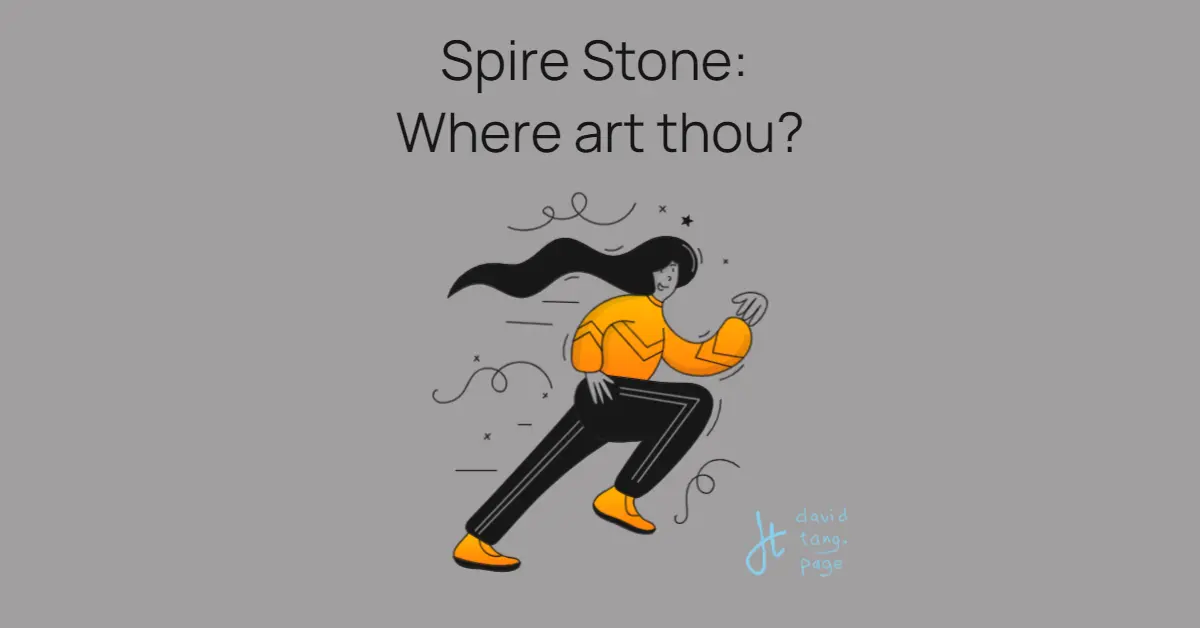What happened to the Spire Stone?
Looking back at an incredible tracking, no-screen device for both physical and mental health. The story of the Spire Stone - the rise and sunset.

Rise and sunsetting of a health product. Rise from the ashes anew.
While looking up distraction-less trackers for one of my articles, I came across the Spire Stone. I was intrigued yet disappointed that I could not get more information about the product.

A quick search turned up their Amazon store - with a decent review count of over a thousand. There were several mentions of it being a unique calming device, focusing on mental well-being improvement. In fact, Forbes cited it as the "Fitbit of the mind"!
Oddly enough, it is now discontinued. I did some more digging and this is what I found out about its story - the rise and sunset.
About Spire Health, Inc
Information surrounding the founding company was proving to be rather elusive. It is a privately held company founded by John Palley, Neema Moraveji, and Ben Yule in July 2013.
Born out of Stanford University's Calming Technology Lab, the Spire Stone was released in 2014 and was eventually retired in 2022.
The Spire Stone
At first glance, it looks promising. I liked the design on the front which is reminiscent of a physician's stethoscope. 🩺

There is a wealth of grounding in the medical literature on the device, which impressed me further. The lab's director had completed a PhD in ambulatory respiratory behavior systems (in extremely simplified terms - ways of monitoring breathing patterns on the go).
The Amazon Store shows a device with a wireless charger, topped with a wooden base. Pretty classy.
At its height, the Spire Stone had its own iOS and Android smartphone app. It was an award-winning device (ie. People’s Design Award at Cooper Hewitt’s National Design Awards).
I thought it stood out among the competitors with a unique angle of measuring breathing. There is a clever mechanism that detects the vibrations of the chest with each inhalation and exhalation.
The team released several updates along the years - revamping the iOS app in 2016, and a price update to $130 also in 2016.
Spire Stone's public reception
There were good reviews generally around. I managed to get my hands on some old blog posts with satisfied reviewers.

One of my favorite experts on the area of wearables, Dr. Betalan Mesko (The Medical Futurist) has this to say in 2018:
"... a few excellent features. The quasi-hypnotic in-app calming exercise that features bubbles moving in tandem with your breath was the highlight for me." - Dr. Mesko.
On the other side of the coin, however, there were numerous mentions of:
- Clips falling off, not secure, or losing them
- Bluetooth connectivity
- Inaccurate readings on breath detection or calorie burnt estimations
- Cost ($150, which is 50% more expensive than the Fitbit Flex at that time priced at $99)
Wind down and future

Along with the Spire Stone, the consumer version of the Spire Tag was also discontinued. The company has made a pivot from the consumer market to solely providing the product via clinicians (b2b).
On the official Spire Health website, there are just a handful of sterile articles on the discontinuation of the Spire Stone. (Would have been friendlier to the customer if the administrator's post did have a profile photo).
Another fitness tracker that was discontinued - "the Pebble" had fared much better in surviving their shutdown. The community came up with Rebble.io that spearheaded continuous support and rebuilt many of the features that would have been lost if the main servers went down.
It makes one uncertain as to why the sudden change of heart. And a hushed discontinuation of the product on their official website.
How is the health of Spire Health, Inc?
About the financial health of the company, one can only project or speculate. I could not find any concrete information but there are some hints around.
Within the US, private companies are not obligated to release any financial information. Since there are no public shareholders, it does not serve them to provide such information openly.
At it's peak, the Spire Stone cemented a decent amount of investor earnings. In John Palley's LinkedIn - it seemed that they have managed to secure investments in the order of millions of dollars.

I think it would be safe to say that they are in a decent position. Edit: update, I found more info about a second round of venture cap funds raised. And it shows that they are solidly moving into the hospitalization and enterprise range.

David's takeaways
There was a huge promise, however, it would seem that one of its co-founders has exited the company for another venture. I am unable to know for sure what transpired behind the scenes. But, if I had to guess he is an inventor that just loves building new things.
Its major competitor, Fitbit was launched merely 5 years earlier. The consumer market is extremely competitive in terms of pricing, positioning and feature provisioning. And Fitbit having that headstart might have just given them a slight advantage to come out ahead.
There was an incredible amount of work, design, and effort put into the Spire Stone. Though it is a shame to not get a Spire Stone 2.0.
On the positive note, I am pleased to know that it lives on in a different form. The Spire Tag is a re-imagination of the product for a healthcare-based setting.
I would personally love the opportunity to trial the Tag with patients. Read my thoughts about it here:


